Evaluating Abraham Lincoln's Leadership Through the Gettysburg Address
VerifiedAdded on 2023/04/20
|5
|1341
|453
Essay
AI Summary
This essay explores the significance and power of Abraham Lincoln's Gettysburg Address, delivered during the American Civil War. It delves into the historical context, highlighting the speech's brevity and simplicity as key strengths. The analysis focuses on Lincoln's rhetorical techniques, such as the use of powerful and relatable language, to connect with the audience and emphasize the principles of equality and freedom. Furthermore, the essay examines Lincoln's leadership qualities, including his ability to listen, learn from mistakes, and share credit, ultimately solidifying his legacy as a great president who guided the nation through a critical period. The essay concludes that the Gettysburg Address remains an iconic speech, embodying the ideals of American democracy and serving as a lasting testament to Lincoln's vision.
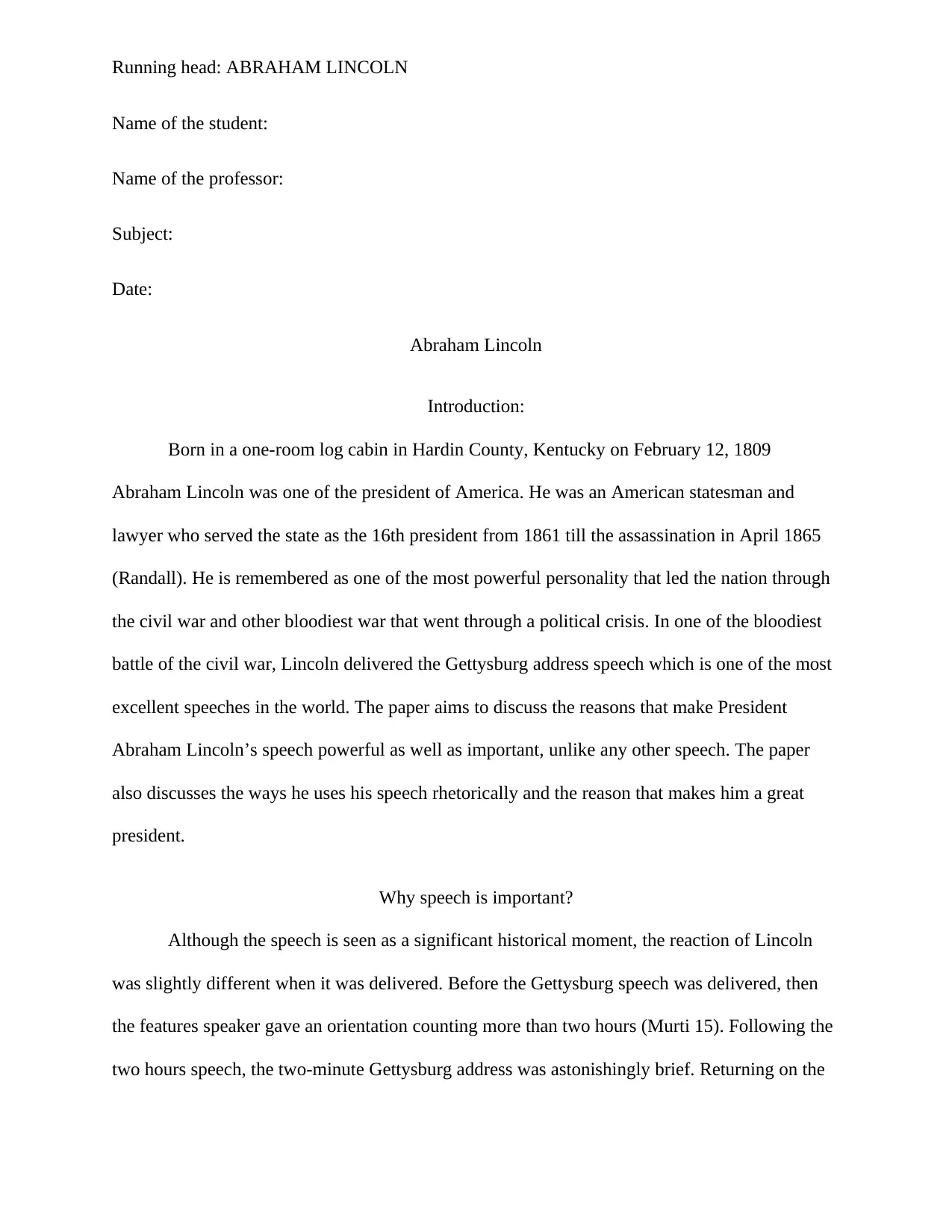
Running head: ABRAHAM LINCOLN
Name of the student:
Name of the professor:
Subject:
Date:
Abraham Lincoln
Introduction:
Born in a one-room log cabin in Hardin County, Kentucky on February 12, 1809
Abraham Lincoln was one of the president of America. He was an American statesman and
lawyer who served the state as the 16th president from 1861 till the assassination in April 1865
(Randall). He is remembered as one of the most powerful personality that led the nation through
the civil war and other bloodiest war that went through a political crisis. In one of the bloodiest
battle of the civil war, Lincoln delivered the Gettysburg address speech which is one of the most
excellent speeches in the world. The paper aims to discuss the reasons that make President
Abraham Lincoln’s speech powerful as well as important, unlike any other speech. The paper
also discusses the ways he uses his speech rhetorically and the reason that makes him a great
president.
Why speech is important?
Although the speech is seen as a significant historical moment, the reaction of Lincoln
was slightly different when it was delivered. Before the Gettysburg speech was delivered, then
the features speaker gave an orientation counting more than two hours (Murti 15). Following the
two hours speech, the two-minute Gettysburg address was astonishingly brief. Returning on the
Name of the student:
Name of the professor:
Subject:
Date:
Abraham Lincoln
Introduction:
Born in a one-room log cabin in Hardin County, Kentucky on February 12, 1809
Abraham Lincoln was one of the president of America. He was an American statesman and
lawyer who served the state as the 16th president from 1861 till the assassination in April 1865
(Randall). He is remembered as one of the most powerful personality that led the nation through
the civil war and other bloodiest war that went through a political crisis. In one of the bloodiest
battle of the civil war, Lincoln delivered the Gettysburg address speech which is one of the most
excellent speeches in the world. The paper aims to discuss the reasons that make President
Abraham Lincoln’s speech powerful as well as important, unlike any other speech. The paper
also discusses the ways he uses his speech rhetorically and the reason that makes him a great
president.
Why speech is important?
Although the speech is seen as a significant historical moment, the reaction of Lincoln
was slightly different when it was delivered. Before the Gettysburg speech was delivered, then
the features speaker gave an orientation counting more than two hours (Murti 15). Following the
two hours speech, the two-minute Gettysburg address was astonishingly brief. Returning on the
Paraphrase This Document
Need a fresh take? Get an instant paraphrase of this document with our AI Paraphraser
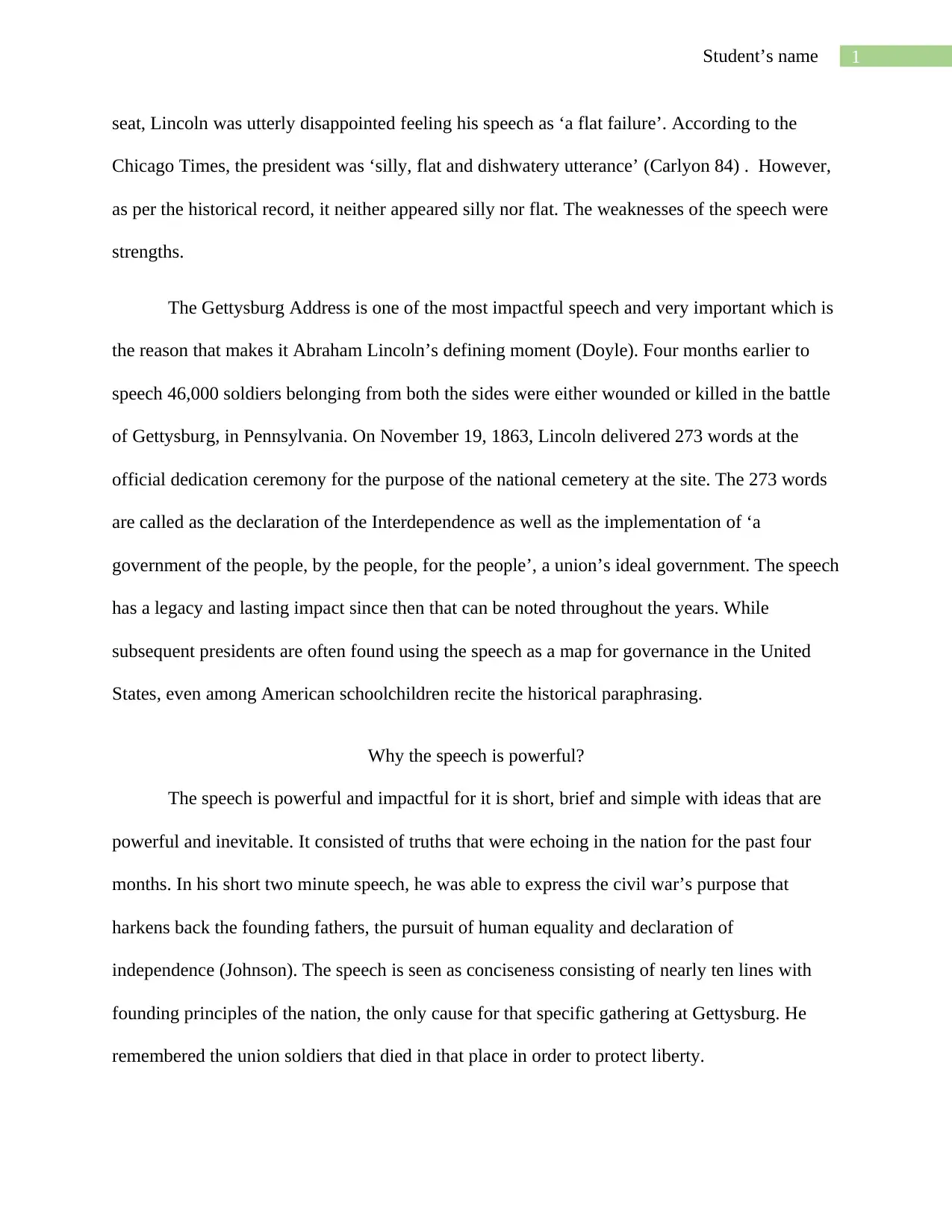
1Student’s name
seat, Lincoln was utterly disappointed feeling his speech as ‘a flat failure’. According to the
Chicago Times, the president was ‘silly, flat and dishwatery utterance’ (Carlyon 84) . However,
as per the historical record, it neither appeared silly nor flat. The weaknesses of the speech were
strengths.
The Gettysburg Address is one of the most impactful speech and very important which is
the reason that makes it Abraham Lincoln’s defining moment (Doyle). Four months earlier to
speech 46,000 soldiers belonging from both the sides were either wounded or killed in the battle
of Gettysburg, in Pennsylvania. On November 19, 1863, Lincoln delivered 273 words at the
official dedication ceremony for the purpose of the national cemetery at the site. The 273 words
are called as the declaration of the Interdependence as well as the implementation of ‘a
government of the people, by the people, for the people’, a union’s ideal government. The speech
has a legacy and lasting impact since then that can be noted throughout the years. While
subsequent presidents are often found using the speech as a map for governance in the United
States, even among American schoolchildren recite the historical paraphrasing.
Why the speech is powerful?
The speech is powerful and impactful for it is short, brief and simple with ideas that are
powerful and inevitable. It consisted of truths that were echoing in the nation for the past four
months. In his short two minute speech, he was able to express the civil war’s purpose that
harkens back the founding fathers, the pursuit of human equality and declaration of
independence (Johnson). The speech is seen as conciseness consisting of nearly ten lines with
founding principles of the nation, the only cause for that specific gathering at Gettysburg. He
remembered the union soldiers that died in that place in order to protect liberty.
seat, Lincoln was utterly disappointed feeling his speech as ‘a flat failure’. According to the
Chicago Times, the president was ‘silly, flat and dishwatery utterance’ (Carlyon 84) . However,
as per the historical record, it neither appeared silly nor flat. The weaknesses of the speech were
strengths.
The Gettysburg Address is one of the most impactful speech and very important which is
the reason that makes it Abraham Lincoln’s defining moment (Doyle). Four months earlier to
speech 46,000 soldiers belonging from both the sides were either wounded or killed in the battle
of Gettysburg, in Pennsylvania. On November 19, 1863, Lincoln delivered 273 words at the
official dedication ceremony for the purpose of the national cemetery at the site. The 273 words
are called as the declaration of the Interdependence as well as the implementation of ‘a
government of the people, by the people, for the people’, a union’s ideal government. The speech
has a legacy and lasting impact since then that can be noted throughout the years. While
subsequent presidents are often found using the speech as a map for governance in the United
States, even among American schoolchildren recite the historical paraphrasing.
Why the speech is powerful?
The speech is powerful and impactful for it is short, brief and simple with ideas that are
powerful and inevitable. It consisted of truths that were echoing in the nation for the past four
months. In his short two minute speech, he was able to express the civil war’s purpose that
harkens back the founding fathers, the pursuit of human equality and declaration of
independence (Johnson). The speech is seen as conciseness consisting of nearly ten lines with
founding principles of the nation, the only cause for that specific gathering at Gettysburg. He
remembered the union soldiers that died in that place in order to protect liberty.
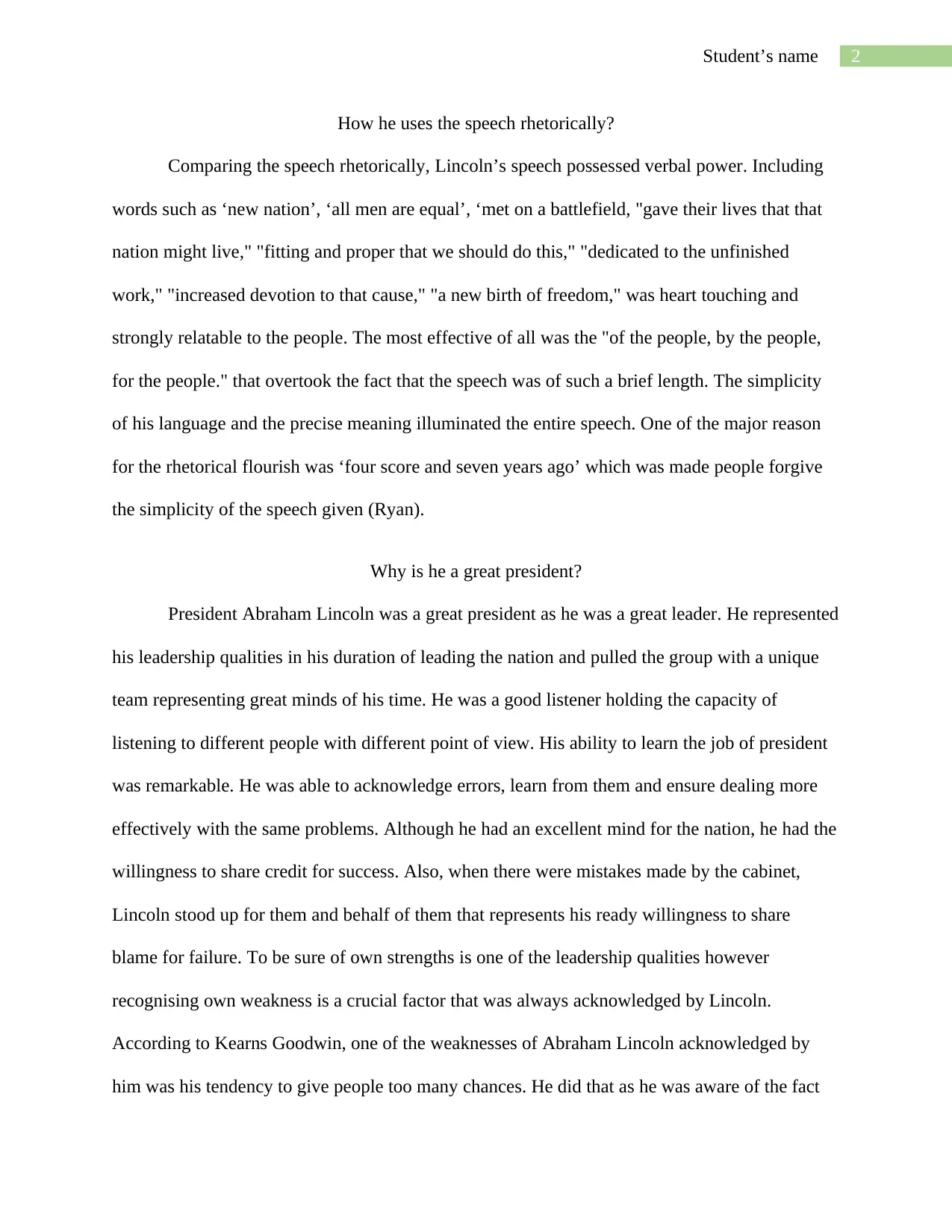
2Student’s name
How he uses the speech rhetorically?
Comparing the speech rhetorically, Lincoln’s speech possessed verbal power. Including
words such as ‘new nation’, ‘all men are equal’, ‘met on a battlefield, "gave their lives that that
nation might live," "fitting and proper that we should do this," "dedicated to the unfinished
work," "increased devotion to that cause," "a new birth of freedom," was heart touching and
strongly relatable to the people. The most effective of all was the "of the people, by the people,
for the people." that overtook the fact that the speech was of such a brief length. The simplicity
of his language and the precise meaning illuminated the entire speech. One of the major reason
for the rhetorical flourish was ‘four score and seven years ago’ which was made people forgive
the simplicity of the speech given (Ryan).
Why is he a great president?
President Abraham Lincoln was a great president as he was a great leader. He represented
his leadership qualities in his duration of leading the nation and pulled the group with a unique
team representing great minds of his time. He was a good listener holding the capacity of
listening to different people with different point of view. His ability to learn the job of president
was remarkable. He was able to acknowledge errors, learn from them and ensure dealing more
effectively with the same problems. Although he had an excellent mind for the nation, he had the
willingness to share credit for success. Also, when there were mistakes made by the cabinet,
Lincoln stood up for them and behalf of them that represents his ready willingness to share
blame for failure. To be sure of own strengths is one of the leadership qualities however
recognising own weakness is a crucial factor that was always acknowledged by Lincoln.
According to Kearns Goodwin, one of the weaknesses of Abraham Lincoln acknowledged by
him was his tendency to give people too many chances. He did that as he was aware of the fact
How he uses the speech rhetorically?
Comparing the speech rhetorically, Lincoln’s speech possessed verbal power. Including
words such as ‘new nation’, ‘all men are equal’, ‘met on a battlefield, "gave their lives that that
nation might live," "fitting and proper that we should do this," "dedicated to the unfinished
work," "increased devotion to that cause," "a new birth of freedom," was heart touching and
strongly relatable to the people. The most effective of all was the "of the people, by the people,
for the people." that overtook the fact that the speech was of such a brief length. The simplicity
of his language and the precise meaning illuminated the entire speech. One of the major reason
for the rhetorical flourish was ‘four score and seven years ago’ which was made people forgive
the simplicity of the speech given (Ryan).
Why is he a great president?
President Abraham Lincoln was a great president as he was a great leader. He represented
his leadership qualities in his duration of leading the nation and pulled the group with a unique
team representing great minds of his time. He was a good listener holding the capacity of
listening to different people with different point of view. His ability to learn the job of president
was remarkable. He was able to acknowledge errors, learn from them and ensure dealing more
effectively with the same problems. Although he had an excellent mind for the nation, he had the
willingness to share credit for success. Also, when there were mistakes made by the cabinet,
Lincoln stood up for them and behalf of them that represents his ready willingness to share
blame for failure. To be sure of own strengths is one of the leadership qualities however
recognising own weakness is a crucial factor that was always acknowledged by Lincoln.
According to Kearns Goodwin, one of the weaknesses of Abraham Lincoln acknowledged by
him was his tendency to give people too many chances. He did that as he was aware of the fact
⊘ This is a preview!⊘
Do you want full access?
Subscribe today to unlock all pages.

Trusted by 1+ million students worldwide
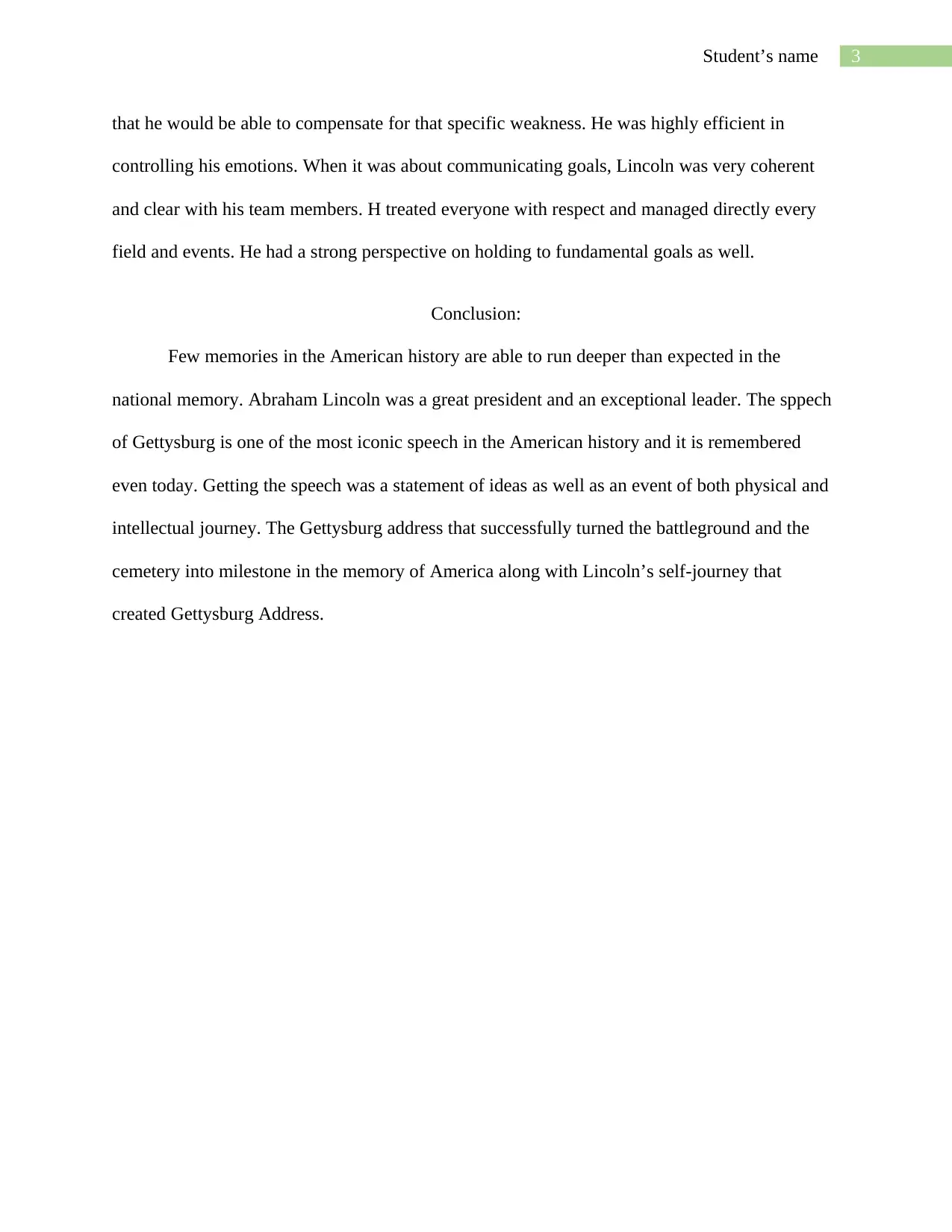
3Student’s name
that he would be able to compensate for that specific weakness. He was highly efficient in
controlling his emotions. When it was about communicating goals, Lincoln was very coherent
and clear with his team members. H treated everyone with respect and managed directly every
field and events. He had a strong perspective on holding to fundamental goals as well.
Conclusion:
Few memories in the American history are able to run deeper than expected in the
national memory. Abraham Lincoln was a great president and an exceptional leader. The sppech
of Gettysburg is one of the most iconic speech in the American history and it is remembered
even today. Getting the speech was a statement of ideas as well as an event of both physical and
intellectual journey. The Gettysburg address that successfully turned the battleground and the
cemetery into milestone in the memory of America along with Lincoln’s self-journey that
created Gettysburg Address.
that he would be able to compensate for that specific weakness. He was highly efficient in
controlling his emotions. When it was about communicating goals, Lincoln was very coherent
and clear with his team members. H treated everyone with respect and managed directly every
field and events. He had a strong perspective on holding to fundamental goals as well.
Conclusion:
Few memories in the American history are able to run deeper than expected in the
national memory. Abraham Lincoln was a great president and an exceptional leader. The sppech
of Gettysburg is one of the most iconic speech in the American history and it is remembered
even today. Getting the speech was a statement of ideas as well as an event of both physical and
intellectual journey. The Gettysburg address that successfully turned the battleground and the
cemetery into milestone in the memory of America along with Lincoln’s self-journey that
created Gettysburg Address.
Paraphrase This Document
Need a fresh take? Get an instant paraphrase of this document with our AI Paraphraser
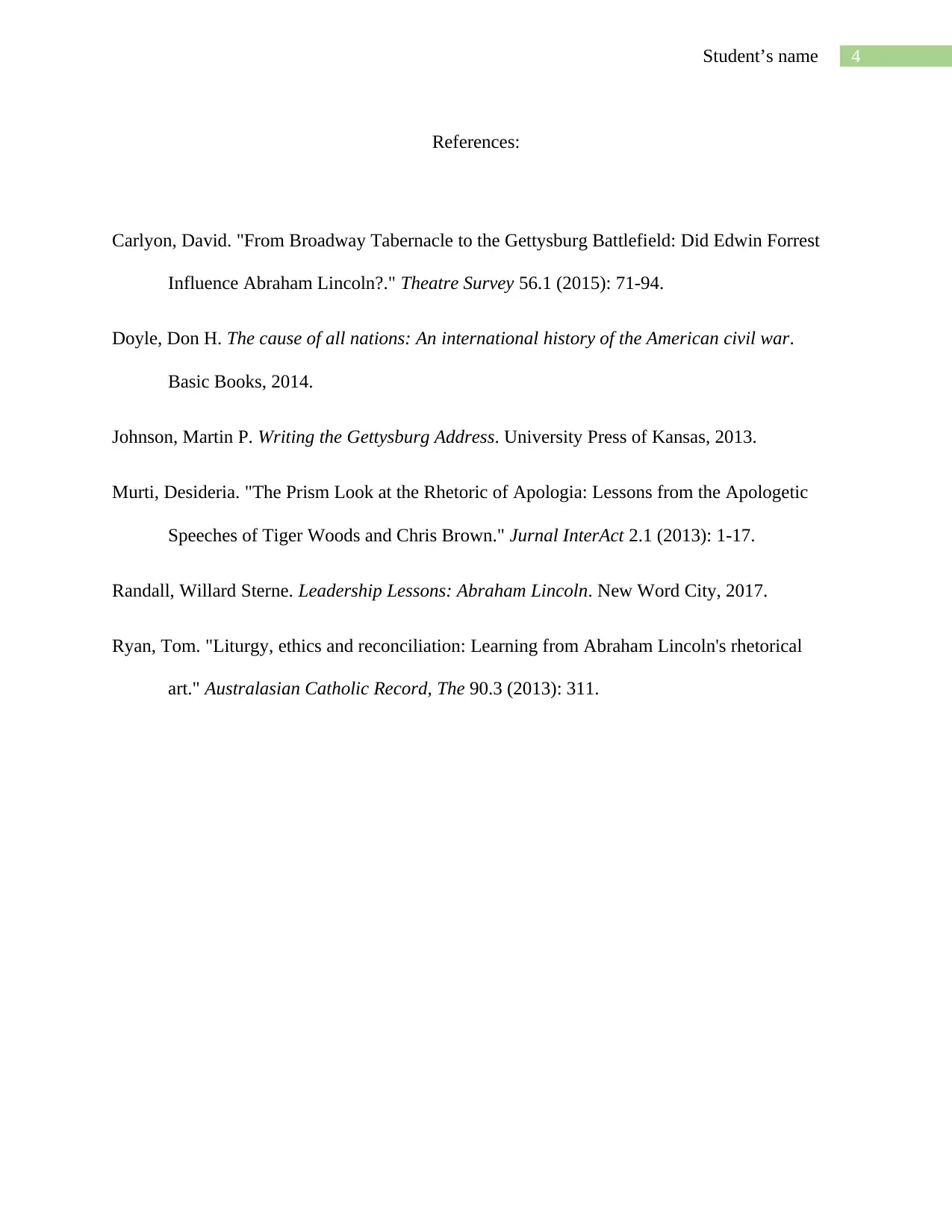
4Student’s name
References:
Carlyon, David. "From Broadway Tabernacle to the Gettysburg Battlefield: Did Edwin Forrest
Influence Abraham Lincoln?." Theatre Survey 56.1 (2015): 71-94.
Doyle, Don H. The cause of all nations: An international history of the American civil war.
Basic Books, 2014.
Johnson, Martin P. Writing the Gettysburg Address. University Press of Kansas, 2013.
Murti, Desideria. "The Prism Look at the Rhetoric of Apologia: Lessons from the Apologetic
Speeches of Tiger Woods and Chris Brown." Jurnal InterAct 2.1 (2013): 1-17.
Randall, Willard Sterne. Leadership Lessons: Abraham Lincoln. New Word City, 2017.
Ryan, Tom. "Liturgy, ethics and reconciliation: Learning from Abraham Lincoln's rhetorical
art." Australasian Catholic Record, The 90.3 (2013): 311.
References:
Carlyon, David. "From Broadway Tabernacle to the Gettysburg Battlefield: Did Edwin Forrest
Influence Abraham Lincoln?." Theatre Survey 56.1 (2015): 71-94.
Doyle, Don H. The cause of all nations: An international history of the American civil war.
Basic Books, 2014.
Johnson, Martin P. Writing the Gettysburg Address. University Press of Kansas, 2013.
Murti, Desideria. "The Prism Look at the Rhetoric of Apologia: Lessons from the Apologetic
Speeches of Tiger Woods and Chris Brown." Jurnal InterAct 2.1 (2013): 1-17.
Randall, Willard Sterne. Leadership Lessons: Abraham Lincoln. New Word City, 2017.
Ryan, Tom. "Liturgy, ethics and reconciliation: Learning from Abraham Lincoln's rhetorical
art." Australasian Catholic Record, The 90.3 (2013): 311.
1 out of 5
Related Documents
Your All-in-One AI-Powered Toolkit for Academic Success.
+13062052269
info@desklib.com
Available 24*7 on WhatsApp / Email
![[object Object]](/_next/static/media/star-bottom.7253800d.svg)
Unlock your academic potential
Copyright © 2020–2026 A2Z Services. All Rights Reserved. Developed and managed by ZUCOL.




